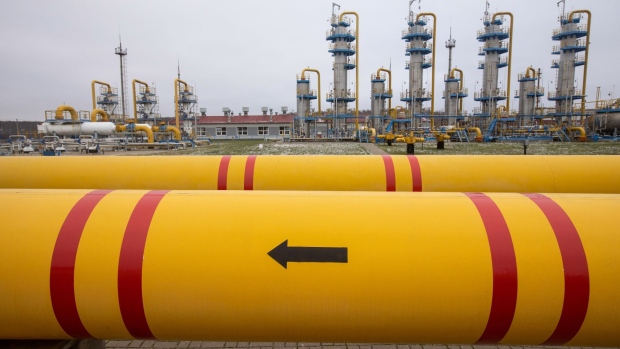Jul 13, 2022
EU Plans Steps to Cushion Impact of Sudden Russian Gas Halt
, Bloomberg News

(Bloomberg) -- The European Union is planning a set of urgent actions across the entire economy -- including reductions to heating and cooling use and some market-based measures -- to mitigate the impact of a possible natural gas supply cut-off by Russia, its biggest source of imports.
The European Commission, the 27-nation bloc’s executive arm, sees a sizable risk that Moscow will halt the shipments of the fuel this year in an abrupt and unilateral way, according to a draft document seen by Bloomberg News. To prepare for this scenario, the commission plans to recommend additional measures the region should consider to curb gas consumption and lower future costs for businesses and consumers.
“Acting now could reduce the impact of a sudden supply disruption by one third,” the EU said in the document, which is still subject to changes before its adoption scheduled for July 20. “Independently of a short-term full disruption, early joint action at EU level at this critical moment of the storage filling process will reduce the need for possible and more painful demand reduction later in the winter, in case of interruption of dlows from Russia.”
The EU’s biggest challenge this winter is to ensure there are sufficient gas reserves to get through peak demand for heating and power. Those stocks also serve as a buffer that allows gas to move across borders within the EU to ensure all member nations have enough supply.
Simulations by EU gas system operators show that in case of a full disruption as of July, storage could be as low as 65% to 71% at the beginning of November, significantly below the 80% target, according to the document. If a disruption occured at a later stage, in October or in the following months, the risk of a gap would be lower but there would be less time to address the situation.
Overall flows from Russia are now less than 30% of the average from 2016 to 2021, according to the document. Curtailments in Russian shipments have affected 12 member states and prompted Germany to raise its gas-risk alert to the second-highest “alarm” level last month.
Read more: European Gas Prices Rise as Nord Stream Works Put Market on Edge
While the EU gas security rules protect specific consumer groups, such as households or hospitals, they also pave the way for governments to prioritize certain critical gas-fired power plants. The commission plans to recommend that, when doing so, member states should consider a set of criteria, focusing on impact on supply chains, competitiveness and the provision of essential products and services for the economy.
“The gas situation in the EU is at a critical juncture,” the commission said in the document. “Everyone can save gas, even if they are in protected sectors, such as households, or buildings operated by public authorities, industries who have fuel switching potential and, depending on the national context, also the electricity sector.”
The draft guidelines to member states also include the following actions:
- fuel switching, both in industries and power production, to preemptively save gas
- market-based measures, including auctions or tender systems, where governments incentivize a cut of consumption by large users, mostly industries
- information campaigns to reduce heating and cooling, as well as mandatory limits during an alert level of crisis
©2022 Bloomberg L.P.








